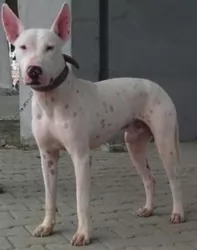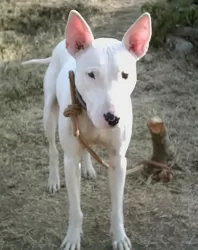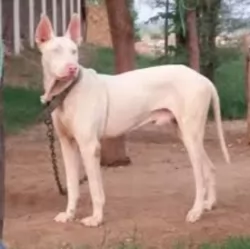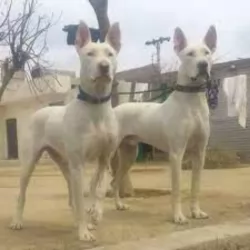 MyDogBreeds
MyDogBreedsGull Terr is originated from Pakistan but Canadian Pointer is originated from United States. Gull Terr may grow 10 cm / 3 inches shorter than Canadian Pointer. Gull Terr may weigh 18 kg / 40 pounds more than Canadian Pointer. Both Gull Terr and Canadian Pointer has almost same life span. Both Gull Terr and Canadian Pointer has same litter size. Both Gull Terr and Canadian Pointer requires Low maintenance.
 The Gull Terr hails from Pakistan. Having been introduced to the country by the British Raj, the dog has always been valued for its guarding and fighting abilities.
The Gull Terr hails from Pakistan. Having been introduced to the country by the British Raj, the dog has always been valued for its guarding and fighting abilities.
The British army, on bringing English Bull Terriers with them, mated them with local dogs. The dog was in other words, created from the old bull terrier which became extinct, and the Bully Kutta.
The Gull Terr or Pakistani Bull Terrier as he is known is a rare breed of dog. Today they are usually found in rural areas of Pakistan as well as in the Indian Panjab area, becoming popular as both pet and watchdog. It is no longer used for dog fighting as this has been banned.
There are some dog breeds whose history and origins are dubious. The existence of the Canadian Pointer is also a matter of debate, and research reveals very scanty information.
The dog seems to have been a gundog which originated in the United States. Another name for the dog is Adirondak Pointing Dog. The Canadian Pointer was developed from English Pointers, Labrador Retrievers and Portuguese Pointers during the 19th century. He was used for hunting and retrieving prey such as birds and rabbits.
 As a medium sized dog, the muscled Gull Terr stands as 45 – 66cm in height and weighs in the area of 40 – 45kg.
As a medium sized dog, the muscled Gull Terr stands as 45 – 66cm in height and weighs in the area of 40 – 45kg.
The dog has a short, smooth coat which is white, but you may find some black spots on him. He has a egg shaped head, ears are naturally erect, dark slanted eyes, and he has a long tail which is held upwards. Muscled and agile, he is a powerful working breed and makes a good watchdog.
This is an aggressive dog breed, and first-time dog owners might want to have a more amicable kind of pet to start off with.
He is a fearless dog, somewhat aggressive and suspicious towards strangers and therefore wants to protect his owner from them. With training and socialization he can be good with children in the home, although he is inclined to be boisterous and stubborn. He has fierce protective instincts, even though he is considered not as aggressive as some other Pakistani dog breeds.
The Gull Terr will need an experienced dog handler. Even though he has been a fighter in his day, he is capable of being an excellent family pet as well. You won't have trouble training him as he is intelligent. He then becomes more obedient and more manageable. He is a very active dog and therefore he won't fit into city dwelling where there are small spaces. He needs a place to run and on top of that he will require a good deal of exercise.
The Canadian Pointer makes for an excellent family pet. He is intelligent, excitable, loving and devoted, forming a strong bond with his human family. Active and excitable, it is this very energetic characteristic which will require him needing training and socialization. He is inclined to want to jump up against his family at the sheer joy of seeing them.
Although he loves country life, his love of human companionship allows him to adapt to city life and he is non-aggressive and can be a placid pet with children and other pets in the home.
The Canadian Pointer is a medium- to large sized breed of gundog. He has a lean, well muscled body with a short, coarse coat. The coat can be dark brown and white, black and white or a fawn color and white. The coat can also be freckled in parts.
He is a gundog belonging to the HPR group. HPR stands for hunting, pointing and retrieving. Weighing roughly 22–27kg, he stands about 56 – 76cm in height. Sometimes the tail is docked but otherwise it is left so that it’s medium length and is held straight out and level with the body. The ears of the Canadian Pointer are fairly short and floppy.
 Your Gull Terr love the attention he receives from his human family and he won’t flourish at all if he is put into the back yard for watch dog purposes only. He is a dog that needs to come indoors to be with his family.
Your Gull Terr love the attention he receives from his human family and he won’t flourish at all if he is put into the back yard for watch dog purposes only. He is a dog that needs to come indoors to be with his family.
He tends to be somewhat aggressive and this is why he isn’t looked upon as the ideal pet for first-time dog owners and those with young children in the home.
He is a confrontational dog, willing to enter into a fight with provocation. Strong willed he will require early training and socialization, and when he is brought up by a firm, consistent, kind owner, he can get over his aggression and become a loyal, devoted, protective and loving pet.
The Canadian Pointer is a dog who thrives on hard work and they are strong-willed, confident and boisterous but never aggressive. They’re intelligent and alert and respond well to training and socialization. Once trained he works hard to please his owner.
The Canadian Pointer is independent and can be aloof around strangers, but he just loves his human family and makes every effort to please them and be around them whenever he can. Treat him properly and he will give you endless hours of enjoyment and companionship.
 The Gull Terr has a deep chest and this means he is more prone to bloat, a condition known as gastric dilation volvulus.
The Gull Terr has a deep chest and this means he is more prone to bloat, a condition known as gastric dilation volvulus.
Your pet's stomach fills with air and this leads to decreased blood flow to vital organs. The stomach can twist and this is when the condition becomes life threatening as blood supply to the stomach is cut off. Instead of feeding him large meals, feed him smaller meals more frequently.
Deafness in your pet can be temporary or permanent, in one ear or both. There are are so many reasons why your pet could be deaf and it could be a birth defect, an infection or old age. Certain dogs such as the white coated Gull Terr are also more predisposed to congenital deafness.
Get him to the vet who will examine your dog’s ear canal for wax and debris and discuss the way to go for your beloved pet.
Pointer dogs are looked upon as a healthy breed, but having said that, they aren’t immune to illness, and there are some common dog diseases that you should be aware of -
This disease is caused by a malformation of the hip joint. This ailment can result in pain and discomfort for your pet as well as arthritis and even lameness. Unfortunately there is no cure but the vet can do a lot to make life more comfortable for your pet.
This is a genetic eye disease where your pet gradually loses vision. The retina deteriorates and stops functioning.
 Easy to look after with his short coat, the Gull Terr will only require a brushing twice a week to keep the coat shiny and healthy.
Easy to look after with his short coat, the Gull Terr will only require a brushing twice a week to keep the coat shiny and healthy.
Because his coat is white, it can show dirt easily, and it will simply require taking a damp cloth and wiping the mark off him. You don't want to be bathing him often as this dries his skin out – rather just wipe the coat down.
Your Gull Terr is a highly energetic dog and he loves nothing more than to be involved in robust exercise and games. He is best suited in a home with large grounds and if you do opt to have him in the city, you will have to pay close attention to his exercise needs – lots of walks, runs, ball games, swimming and running with you as you cycle.
You want to be sure that your energetic Gull Terr has a healthy diet full of important proteins, fats, and carbohydrates.
Protein is always important for a dog like this and you want to make absolutely sure that apart from his high quality kibble, you mix in raw meat from time to time as well as cooked chicken, fish, brown rice and vegetables.
When looking for a commercially manufactured dog food, look for high-quality animal protein as a top ingredient. Make sure he always has fresh, cool water available to him.
The Canadian Pointer was specifically developed to be a hunter so he is an energetic dog. When it comes to caring for him, training and socialization can make him an even more amicable pet. He is muscled and lithe and you want to keep him that way by ensuring he is well exercised.
Take him on walks, into the park with ball and frisbee or let him run while you cycle. Don’t leave him without exercise as he can become frustrated and ill.
The Canadian Pointer is a low maintenance breed with his short coat. You’ll need to give his coat a good brushing twice a week to rid him of loose hairs to keep the hair shiny and healthy.
Dogs like the Canadian Pointer with floppy ears will need to have their ears checked for infections to avoid hearing loss. You’ll see your dog shake his head, the inside of his ears may be red and he could have a moist discharge.
Remember that yeast and bacteria are problems with floppy-eared dog breeds and you’ll need to ensure that the ears are cleaned and kept dry. Be careful if you don’t know how to do it, and get advice from your veterinarian on how to attend to the ears of your dog.